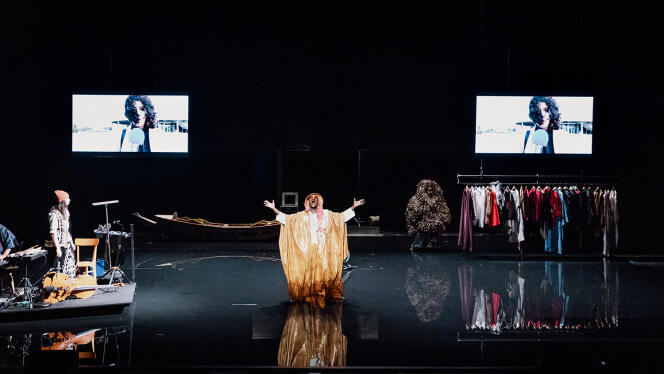Koltès and Shakespeare, Bolaño and Chekhov, Rambert and Racine: in twenty years of a career in public theater, Adama Diop, 42, has served varied repertoires. In 2020, the Covid-19 pandemic dislodged him from the stage and reduced him to silence: “I suddenly slowed down and began to think about my deep desire,” remembers the actor. Writing, practiced in particular through verse poems when he was a teenager in Dakar, attracted him. “Writing forces you to listen, to look around you. However, I only understand my job when I am connected to the world,” he said.
Franco-Senegalese, Diop is “what we call an immigrant in France, but what we call an expatriate when it comes to French people abroad”. An exile, in short, a status shared by so many others and which he explores in his own way in Fajar or the odyssey of the man who dreamed of being a poet, his first stage creation, to be discovered from February 28 to March 9 at the MC93 in Bobigny and on tour throughout France.
To tell the story of uprooting and arriving in a new country without bringing everything back to his personal experience, Adama Diop constructed, over several months, a hybrid show which interweaves video, live music, poetry, storytelling and dialogue. It traces the story of Malal (whom he plays), whose land of origin is no more specified than his host country – we simply know that he is carrying out a ” crossing “.
In French and Wolof
Throughout the performance, in French and Wolof, the spectator will come across Malal’s parents or wife, represented on the screen, but also nebulous figures escaped from his daydreams: Marianne, an allegory of freedom, or “the blind old man” who reads the future. “As if we were projected into the brain of the hero”, the story advances in fragments. ““Migrants”, as we sometimes hear on TV, is a name that does not exist, underlines Adama Diop. Everyone of course has their own story, but I wanted us to focus on a human who shares the same journey with other humans: we go to the neighboring village, then to the neighboring country, then to the end of the world. »
In August 2020, eager to listen to testimonies, he went to the island of Lesbos, in Greece, to the Moria camp, a camp of more than 20,000 refugees opened in 2013, which he was able to enter without difficulty and which will be set on fire shortly after his visit. Exchanges with Afghans or Congolese, some of whom have lived there for sometimes a year in unsanitary conditions, he will keep ” an atmosphere “ that he tries to reinject into episodes of the writing of his play, and the memory of sounds or images that he summons on stage. “The song of the crickets, the setting sun over the large expanses of olive trees, and above all the cries of the children playing”, describes for example the storyteller during the representation of Fajar.
You have 36.58% of this article left to read. The rest is reserved for subscribers.
